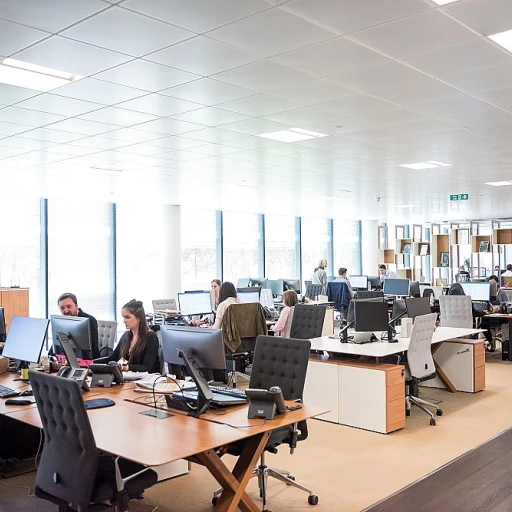
Understanding Comprehensive Procurement Solutions
Decoding the All-Encompassing Nature of Procurement
As organizations navigate complex business environments, comprehensive procurement solutions have become an indispensable part of strategic management. This expansive approach extends beyond the mere act of purchasing goods and services. It involves a cohesive method of procurement management, where every aspect from sourcing to final purchase is meticulously scrutinized to drive optimal efficiency.
Fundamentally, procurement is about ensuring the uninterrupted flow of critical materials and services through a well-organized supply chain. This intricacy requires adept coordination, collaboration, and communication with suppliers, ensuring seamless integration within the company’s operational framework. Key elements such as supplier performance and compliance are critical in this intricate dance, as is the adherence to budget approvals over the long term.
One notable aspect of contemporary procurement solutions is the role of digital procurement. With digital platforms enhancing data collection and analysis, organizations are better positioned to anticipate needs, streamline the procurement process, and make more informed decisions. This transition to a digital realm complements the consulting services that many procurement leaders rely on to optimize sourcing strategies, manage cost implications, and enhance supplier relationships.
Both managed services and procurement outsourcing are tailored to aid procurement teams by offloading non-core activities, allowing for a concentrated focus on strategic elements. In this way, firms can leverage the specialized capabilities of procurement consultants, ensuring efficient procurement and compliance within the supply chain framework.
For a deeper dive into how comprehensive procurement solutions are playing a pivotal role in promoting eco-friendly practices, particularly within unique sectors like golf course innovations, explore more insights in our focused article related to sustainability advancements.
The Role of Technology in Procurement
Embracing Digital Transformation in Procurement
The landscape of procurement is rapidly evolving, with technology playing a pivotal role in reshaping how organizations manage their procurement processes. Digital procurement is not just a buzzword; it's a necessity for businesses aiming to streamline their operations and enhance supplier relationships. By leveraging advanced technologies, companies can optimize their procurement management, ensuring compliance and improving supplier performance.
One of the key benefits of digital procurement is the ability to harness data effectively. Data-driven insights allow procurement teams to make informed decisions, from sourcing to purchase order management. This not only enhances the efficiency of the procurement process but also helps in cost management, ensuring that budgets are adhered to and resources are allocated wisely.
Integrating Technology for Enhanced Supplier Performance
Technology also plays a crucial role in supplier management. By utilizing digital tools, organizations can monitor supplier performance in real-time, ensuring that goods and services are delivered on time and meet quality standards. This level of transparency fosters stronger supplier relationships and can lead to long-term partnerships that benefit both parties.
Moreover, digital solutions enable procurement leaders to manage the entire supply chain more effectively. From procurement outsourcing to consulting services, technology provides the tools necessary to navigate the complexities of global supply chains. This is particularly important in today's globalized market, where the ability to adapt quickly can be a significant competitive advantage.
For those interested in exploring how cloud technology can further transform procurement processes, consider reading about transforming human resources with cloud technology. The insights gained can be applied to enhance procurement strategies, ensuring that organizations remain agile and responsive to market demands.
Adapting to a Globalized Market
Adapting Procurement to a Globalized Marketplace
In today's dynamic business environment, adapting the procurement process to the globalized market is crucial for organizations striving for efficiency and innovation. This shift demands a comprehensive approach to procurement services, which involves integrating digital technologies and global strategies. Global sourcing is a significant trend organizations must embrace as they aim to optimize supplier performance and manage relationships effectively. This approach allows businesses to tap into diverse markets, reducing costs associated with goods and services. However, navigating compliance and ensuring data security in different jurisdictions pose challenges that must be strategically managed. Procurement leaders are increasingly turning to procurement consulting services and digital procurement platforms to gain a competitive edge. These tools streamline procurement management, enabling real-time data analysis and facilitating quick adjustments to supply chain strategies. Embracing a digital-first mindset not only enhances the end procurement process but also ensures long-term sustainability in procurement management. Moreover, global procurement requires strong supplier relationships and effective end-to-end procurement management. This calls for procurement teams to be well-versed in cultural nuances and equipped with the skills to collaborate across borders. Involving consulting services can provide the expertise necessary to navigate these complex landscapes and ensure successful procurement outcomes. As the market continues to evolve, organizations must focus on adapting their procurement strategies to maintain relevance and sustainability. By leveraging technology and embracing a global perspective, companies can ensure they remain competitive in the ever-changing business landscape. To delve deeper into unlocking leadership potential within these evolving dynamics, explore insights from the Perspectives Leadership Academy. leadership potential within these evolving dynamicsSustainability in Procurement
Integrating Sustainability into Procurement Practices
In today’s rapidly evolving business landscape, sustainability has become a cornerstone of procurement strategies. Companies are increasingly recognizing the importance of integrating sustainable practices into their procurement process to not only meet regulatory compliance but also to enhance supplier performance and ensure long-term success.
Sustainability in procurement involves a comprehensive approach that includes sourcing goods and services responsibly, reducing environmental impact, and promoting ethical supplier relationships. This shift is driven by both consumer demand and the need for organizations to align with global sustainability goals.
Key Strategies for Sustainable Procurement
- Supplier Engagement: Building strong supplier relationships is crucial. Procurement teams must work closely with suppliers to ensure they adhere to sustainable practices. This involves regular performance evaluations and compliance checks.
- Data-Driven Decisions: Utilizing data analytics in procurement management helps organizations track and measure the sustainability of their supply chain. This data-driven approach allows for more informed decision-making and enhances overall procurement performance.
- Digital Procurement Solutions: Leveraging digital tools and technologies can streamline the procurement process, making it easier to implement sustainable practices. Digital procurement platforms offer real-time insights and facilitate better management of purchase orders and supplier performance.
- Consulting Services: Engaging with procurement consultants can provide valuable insights and strategies for integrating sustainability into procurement. These experts offer guidance on best practices and help companies navigate the complexities of sustainable sourcing.
By focusing on these strategies, organizations can effectively manage their procurement services while ensuring sustainability is at the forefront of their operations. This not only benefits the environment but also enhances the company’s reputation and competitiveness in the global market.
Skills for the Future of Procurement
Essential Skills for the New Era of Procurement
To excel in the ever-evolving sphere of procurement management, professionals must hone and master a set of diverse skills. These skills go beyond traditional competencies, demanding adaptability and a forward-thinking mindset to navigate the complexities of a rapidly globalizing market.- Digital Literacy
- Analytical Abilities
- Strategic Sourcing and Supplier Relationship Management
- Financial Acumen
- Adaptability and Flexibility
- Sustainability Awareness
Case Studies: Success Stories in Procurement Transformation
Transformative Procurement Journeys
In the rapidly evolving landscape of procurement, several organizations have successfully transformed their processes, showcasing the potential of comprehensive procurement solutions. These case studies highlight the integration of technology, adaptation to global markets, and a focus on sustainability, all of which are crucial for modern procurement strategies.
Leveraging Technology for Efficiency
One notable example is a multinational corporation that implemented digital procurement tools to streamline their purchase order and supplier management processes. By adopting a digital procurement platform, the company enhanced its data analytics capabilities, allowing for real-time monitoring of supplier performance and compliance. This shift not only reduced costs but also improved the overall efficiency of their supply chain.
Global Market Adaptation
Another success story comes from a mid-sized enterprise that expanded its sourcing strategy to include international suppliers. By utilizing procurement consulting services, the company was able to navigate the complexities of global trade, ensuring compliance with international regulations. This strategic move allowed them to access a broader range of goods and services, ultimately strengthening their competitive edge in the market.
Sustainability as a Core Principle
A leading example in sustainable procurement is a company that prioritized eco-friendly sourcing. By partnering with suppliers committed to sustainable practices, they managed to reduce their environmental footprint significantly. This approach not only aligned with their corporate social responsibility goals but also resonated with environmentally conscious consumers, boosting their brand reputation.
Skills Development for Future Success
Finally, a large organization focused on upskilling its procurement teams to meet future challenges. Through targeted training programs and collaboration with procurement consultants, they equipped their staff with the necessary skills to manage complex procurement processes effectively. This investment in human capital has positioned them as leaders in procurement management, ready to tackle future demands.
These case studies underscore the importance of a comprehensive approach to procurement, integrating technology, global strategies, sustainability, and skills development to achieve long-term success.













